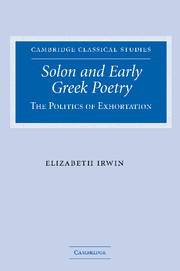Book contents
- Frontmatter
- Contents
- Acknowledgements
- List of abbreviations and editions
- Introduction
- PART I THE POLITICS OF EXHORTATION
- PART II POLITICAL POETICS: SOLON'S EUNOMIA
- PART III POETRY AND POLITICAL CULTURE
- Introduction
- 7 Solon and the language of tyranny
- 8 Rewriting (some) history: Solon and Peisistratus
- Conclusion
- Appendix I Who were Tyrtaeus' gymnetes?
- Appendix II λυκάβαντος: when the wolf comes?
- Bibliography
- General index
- Index locorum
Introduction
Published online by Cambridge University Press: 05 November 2009
- Frontmatter
- Contents
- Acknowledgements
- List of abbreviations and editions
- Introduction
- PART I THE POLITICS OF EXHORTATION
- PART II POLITICAL POETICS: SOLON'S EUNOMIA
- PART III POETRY AND POLITICAL CULTURE
- Introduction
- 7 Solon and the language of tyranny
- 8 Rewriting (some) history: Solon and Peisistratus
- Conclusion
- Appendix I Who were Tyrtaeus' gymnetes?
- Appendix II λυκάβαντος: when the wolf comes?
- Bibliography
- General index
- Index locorum
Summary
The political issues raised in Solon's poetic appropriations provide the basis for the chapters of this Part. With these chapters, discussion of Solon will open out both to the language of a larger group of his poems, including those in metres other than elegiacs, and to ancient and modern evaluations of his career. The aim is to use the greater appreciation of his poetic stance developed in Part II in order to begin to re-evaluate traditional accounts of the relationship between Solon the poet and Solon the political figure and to reposition Solon and his poetry within their historical context.
Chapter 7 substantiates the political use of poetry through an analysis of some peculiarities in Solon's language, and provides a basis from which future investigation may proceed. By surveying five examples of Solon's striking use of language and imagery, I argue that not only does Solon's own political and poetic agenda help account for the choices he makes in his poetic appropriation – for example, his use of Hesiod with a punch – but that interesting twists on traditional language in Solon's poetry are best seen as reflecting and exploiting a larger nexus of contemporary political practice. In itself this ought not to be surprising: the repetition of particular words in Solon often gives them the ring of political catchwords, and Solon's poetry represents a contemporary poetic description of the clash of groups and of the circumstances that could and did in fact give rise to a tyrant.
- Type
- Chapter
- Information
- Solon and Early Greek PoetryThe Politics of Exhortation, pp. 201 - 204Publisher: Cambridge University PressPrint publication year: 2005

